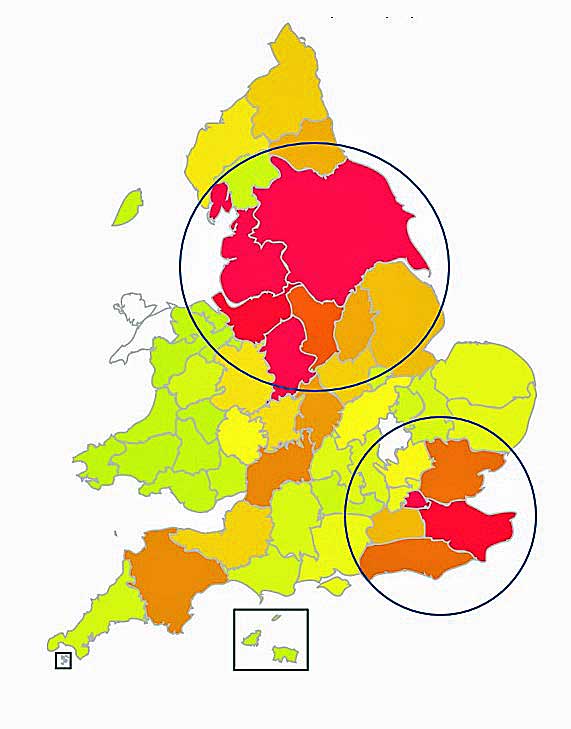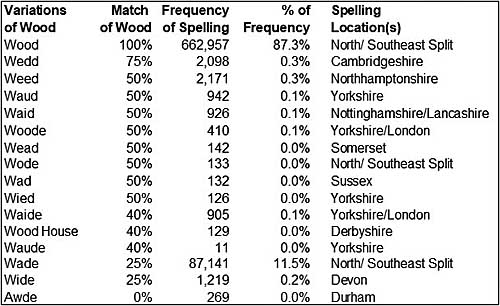
 As a starting point, the data show that the Wood families of Essex are an enclave with few connections to the Wood families in the North, residing in counties such as Yorhshire.
Of course, there are exceptions. The data also show stability in the presence of Wood familes living in Essex during the 19th century. Because mobility between counties increased during the 19th century, and because the Wood families
of Essex did not conform to the trend, we can guess that the number of Wood families in Essex as a percentage of the population was also stable during the 18th century, a period of minimal mobility. Finally, if your resarch hits a
roadblack, please consider the Wade surname. The stability of the Wood suranme in Essex, plus the phonological similarity of Wood and Wade increase the chances that your hard-to-find ancestor could be hidden behind the Wade surname.
As a starting point, the data show that the Wood families of Essex are an enclave with few connections to the Wood families in the North, residing in counties such as Yorhshire.
Of course, there are exceptions. The data also show stability in the presence of Wood familes living in Essex during the 19th century. Because mobility between counties increased during the 19th century, and because the Wood families
of Essex did not conform to the trend, we can guess that the number of Wood families in Essex as a percentage of the population was also stable during the 18th century, a period of minimal mobility. Finally, if your resarch hits a
roadblack, please consider the Wade surname. The stability of the Wood suranme in Essex, plus the phonological similarity of Wood and Wade increase the chances that your hard-to-find ancestor could be hidden behind the Wade surname.
On the 1841 UK census, 53,347 individuals are enumerated with the surname of Wood in the counties of England. Of the total, 6,376 resided in London and a scant 1502 resided in Essex, which implies fewer than 300 households. Twenty counties account for 90% of all individual with the surname Wood. The counties with the highest density of the surname Wood are Yorkshire (21%), Lancashire (12%), Middlesex/London (12.6%), Staffordshire (5.4%), and Kent (5%). The North and Southeast regions (the two circles on the map of England) account for more than two-thirds of people in England with the Wood surname on the 1841 census.

In the 19th and 18th centuries, the Wood surname was bimodal. Bimodal means a graph of data has two peaks. Using non-statistical language, the average person might say the Wood surname was not concentrated in one location but was found in two main areas. Two statistical peaks tend to infer two distinct groups.
The distribution map shows a concentration of the Surname Wood in the North and in the Southeast. In the North, 45.4% of all individuals with the surname Wood resided in Yorkshire, Lancashire, Staffordshire, and Cheshire. In the Southeast, 23.2% of them resided in Middlesex (London), Kent, Sussex, and Essex.
The concentrations in the North and the Southeast exchanged residency with London. In contrast, the North and Southeast concentrations during the 18th century were island-like. The Wood households of Essex, as a group, did not have immediate family connections with the Wood households in the North. A research priority is to determine if the two regions connect at an earlier date.
Between 1841 and 1881, the percent of all individuals with the surname Wood living in Essex dropped from 2.8% to 2.6%, demonstrating stability that logically extends back to 1700.
Distribution Map and Table for the surname Wood based on 1841 census of English Counties using your-family-history.com
On the 1841 census the surname Wood is spelt sixteen different ways: Wood, Wedd, Weed, Waud, Waid, Woode, Wead, Wode, Wad, Wied, Waide, Wood House, Waude, Wade, Wide, and Awde. The distribution of Spelling Variations at a high level confirms that the Wood lines in the North and those in the Southeast are two different groups. For exmaple, the spellings Waud, Woode, Wied, and Waude are found primarily in Yorkshire. Other variations of Wood are found almost exclusively in Cambridgeshire, Northhamptonshire, Somerset, Sussex, Derbyshire, Devon, and Durham. Families who spell Wood using the variation associated with a certain county are presumed to be from that county.
Understanding the variant spellings of the surname Wood is not an exact science. Spellings of a surname can vary due to many things such as local dialects, poor penmanship, aural mistakes, and language shifts. There are two basic types of variation: how a surname is spelt (orthography) and how it is heard (phonological awareness). Analysis of variant spellings must at a minimum consider phonetics, distribution, and frequency.

I am guessing that the Soundex code today is not as popular as it used to be because researchers have access to large, clean databases that can search for any exact spelling. Still, the Soundex is useful as an introduction to how surnames are mispronounced and mis-heard. After all, census records and parish records during the 19th and 18th centuries were created by someone saying their surname and an official writing down what they heard.
The Soundex code disregards vowels (a, e, i, o, u and y) as well as the consonants h and w, unless these letters start the surname. The rest of the consonants are divided into six groups. Consonants whose sounds can be confused are assigned the same numeric code.
Imagine you are speaking to senior citizens whose hearing is not as sharp as when they were young. For them, the letters in Group 1 (b, f, p, v) are hard to hear correctly. The only two consonants that are not typically confused with another consonant are the l (as in life) and r (as in run).
The perspective of phonetics changes how we hear the surnames Wood versus Wade. In terms of spelling, Wade is only a 25% match with Wood but in terms of the Soundex they are the same W300 code. The Soundex code always starts with one letter followed by three digits. Zeroes are used if the surname lacks enough digits. In the case of Wood or Wade, the code begins with W. Vowels are ignored. The only consonant is d, whose code number is 3. Two zeroes are added because both Wood and Wade only have one qualifying consonant.
In Essex, the 1841 census has 1,502 individuals with the Wood surname and 460 individuals with the Wade surname. If you are looking for a Wood record in a parish that has Wade, you might consider if Wade is really Wood. How to decide? The answer is something like “preponderance of evidence.” If the frequency of Wade is low and the Wood surname is established in the parish, then the dangling Wade record might be a Wood. Or if the Wade record was created soon after a new parish priest arrived in the parish, the Wade record might be for a Wood.
We do not know what you know. Please share with us your knowledge, and help us correct any error you find in our research.